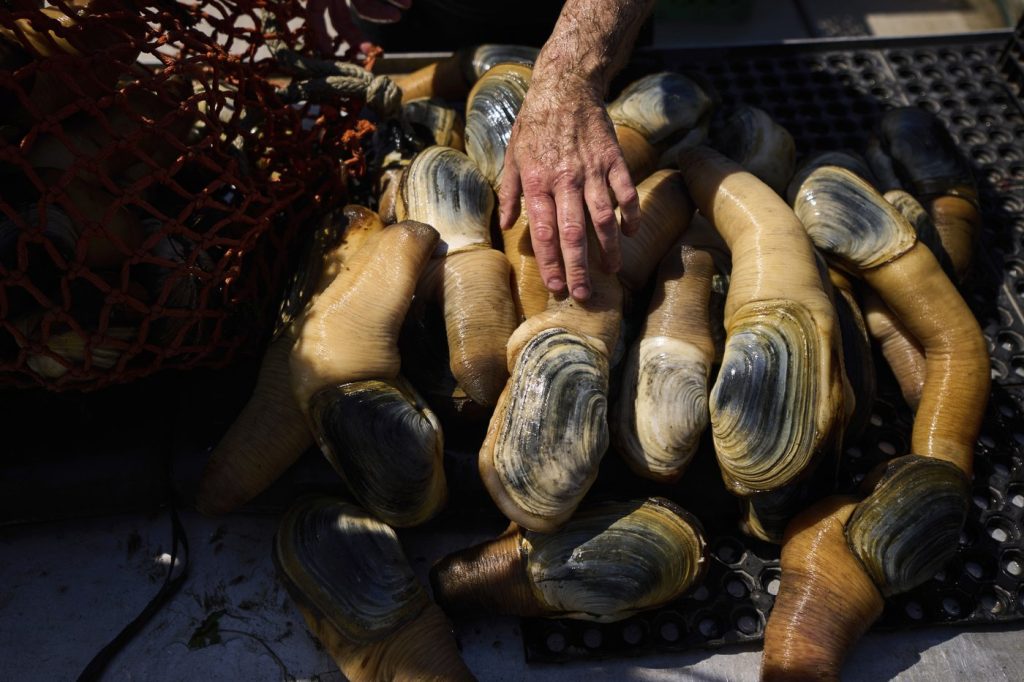SUQUAMISH, Wash. (AP) — For over two decades, Joshua George, a tribal member of the Suquamish Tribe, has dived into the emerald waters of the Salish Sea to harvest the geoduck, a uniquely phallic clam that has garnered significant demand thousands of miles away. Pronounced “gooey-duck,” this is the world’s largest burrowing clam, historically harvested by Indigenous ancestors in the Pacific Northwest long before European settlement.
Recently, geoducks have gained popularity as a delicacy in China, with Washington State exporting approximately 90% of its harvest to the lucrative Chinese market. However, the ongoing trade war between the United States and China is crippling this industry, leaving divers in Washington State without work, exporters in Seattle struggling to stay afloat, and Chinese consumers faced with diminished access to these prized clams.
“It’s the first time in 24 years where I don’t know when or if we’ll be going back to work or if I have to find another job,” George expressed regarding the uncertainty of his occupation amid the tariffs and trade tensions. The economic feud, instigated during President Donald Trump’s first term, escalated rapidly when he re-imposed tariffs on China in February, leading to China retaliating with hefty tariffs on U.S. goods, including geoducks.
As the trade war continued to unfold, the demand for geoducks plummeted, particularly impacting the live-harvest operations which rely on fresh distribution to maintain quality. Jim Boure, the general manager of Suquamish Seafoods, reported a complete halt in operations, “The whole market, everybody just had to stop. We started getting phone calls from buyers saying orders are canceled.” The decline in export orders left divers with half the harvest they had anticipated for the year.
The Washington State Department of Natural Resources has indicated that divers had only harvested about half of the expected quota by late April, significantly reducing revenue for state and tribal fisheries. Last year, Washington and its tribal partners harvested approximately 3.4 million pounds of geoduck, generating $22.4 million in revenue which is crucial for funding local aquatic restoration projects.
As the tariff disruptions continue, the Suquamish operation currently lacks any active orders for harvest. On a day in April, George's team took time for a sample geoduck collection for state testing, a necessary measure to remain prepared for future dates when harvesting could resume. George remarked that despite the external pressures, he enjoys the dive job that has allowed him to be present for his family’s growth.
The trade war has inadvertently benefited Canadian geoduck suppliers, who have management over a mere 25% tariff compared to the U.S.’s staggering 125%. Canada, alongside Washington State, is among the only regions where geoducks naturally grow. James Austin, president of Canada’s Underwater Harvesters Association, highlighted that Canadian suppliers have become the leading exporters to China, causing increased prices due to the lack of competition. Austin anticipates the Canadian geoduck harvest will reach around 2.75 million pounds in 2025.
For American divers like Derrick McRae and his brother, the challenges posed by the tariffs have intensified. After resuming work following months of inactivity, the brothers managed to harvest about 800 pounds of geoducks in a single day, emphasizing the anxiety for the future of their lively hood and the industry's viability. McRae elaborated on the stress surrounding financial uncertainty, “We’re just kind of waiting on the edge of our seats to see what happens next.”
Ian Child, a geoduck farmer, also reflected on the negative impacts of the tariffs, stating that it has disrupted not just his income but the entire farming process since he cannot plant new crops while unharvested clams remain. Despite the challenges posed by the trade tensions, Child remains optimistic about the underlying demand from China for geoducks, contingent on the resolution of tariff issues.











